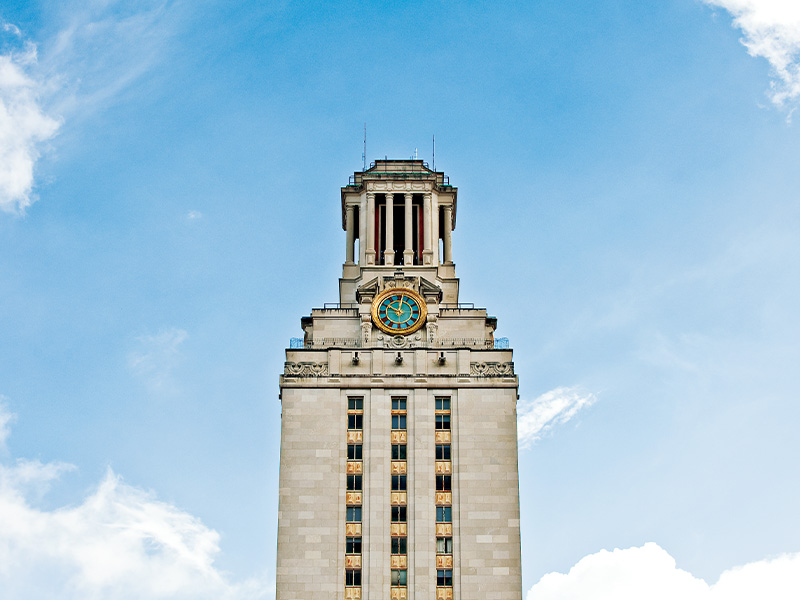Cockrell School Student Entrepreneurs To Pitch New Startups at Longhorn Demo Day

On Thursday, April 24, 11 student startups — including four startups founded by current Cockrell School students — publicly pitched their ideas at the biannual Longhorn Startup Demo Day, a popular UT Austin event put on by the Longhorn Startup Lab, a semester-long course in the Longhorn Startup Program that helps train student entrepreneurs and launch them to future success.
Ranging from harvesting energy while walking to building assistive devices for people with mobility impairments, the four engineering startups all have the potential to benefit a variety of industries.
MicroMulsion
Biomedical researchers often depend on cell culture to test products without having to test directly on humans. To do this, researchers supply cells with growth factors to help them grow the way natural cells would. Outside the body, these growth factors degrade quickly and are expensive to replace.
Four biomedical engineering seniors have adapted a technology developed by a former professor to create a new microgel that helps prolong the life of these growth factors while reducing lab costs for researchers.
For the MicroMulsion team, the Longhorn Startup Lab has been instrumental in bringing their microgel out of the lab and into the market.
“It hasn’t been easy, but it has been exciting,” said the team’s research director and biomedical engineering senior Nishant Mehta. “I thought from a scientific point of view that if you make a great product, it will sell itself, and that’s just not true — you have to develop marketing and business plans.”
Having begun the patent process on the microgel, the team plans to continue with MicroMulsion after graduation while several of the team members are in graduate school.
Freeput
When biomedical engineering senior Vincent Liao tested the Oculus Rift virtual reality developer kit last summer, it inspired a startup that could revolutionize the way people with mobility impairments use technology.
His startup, Freeput, has introduced a small hands-free device that allows users to give commands to a computer using electro-ocular signals from a wink of the eye. The device, in its current state, is fixed to the user’s temple and can tell the difference between a voluntary wink and an involuntary blink.
Three commands — left, right, and winking with both eyes — currently allow users to make selections on simple menus or play basic games like Tetris.
By participating in the Longhorn Startup Lab, the team gained extensive networking and business experience, and they were able to acquire additional team members with diverse areas of expertise.
“We actually recruited a lot of people,” said biomedical engineering senior and head of the team’s research and development, Jane Vinogradova. “The class is a networking opportunity in itself. Longhorn Startup is one of the most valuable classes on this campus.”
SocialToast
With loud music and noisy conversation, coordinating a night downtown with a group of friends can be a nightmare of missed calls and texts. Founded by four electrical and computer engineering students, SocialToast helps maximize your nights out.
SocialToast is an iPhone application that started in a software lab last spring. With 500 downloads since the app’s launch, the team members have received positive feedback from students at UT Austin and have fulfilled a goal of their own to create a product they will actually want to use.
“We wanted to be the customers, not just the creators,” said electrical and computer engineering senior and SocialToast CEO Rachel Peters.
Without any business experience, the team said the learning curve was steep when they were accepted to the Longhorn Startup Program. With a variety of speakers visiting the class every week, along with a mentor at Austin’s Capital Factory, SocialToast was able to connect with entrepreneurs and ask big questions along the way.
Everywhere Energy
People generate energy every day through simple movement. What if we could harness that energy and use it to, say, charge our phones? That’s the goal senior electrical and computer engineering student Darla Hollander plans to achieve with startup Everywhere Energy.
Everywhere Energy is a company dedicated to harnessing energy from everyday movement and using that energy to charge other things. Their first product, the Eversole, is a Dr. Scholl ’s-style shoe insert that gathers kinetic energy as a person walks and then converts it into electrical energy. This, in turn, charges a battery pack that clips onto the shoe, which can then be removed and used to charge a cell phone.
The team, co-founded by four electrical and computer engineering students, plans to launch a Kickstarter to fund continued research, development, and manufacturing to get the Eversole ready for market.
“I think we’re really fortunate to have an engineering background, because it kind of makes everything else easier,” said team COO Melinda Haghighatian.
Ultimately, Hollander said, the idea behind using readily available energy is something she hopes to expand beyond the Eversole and into multiple industrial and everyday uses — for example, harnessing energy from cars rolling over speed bumps to power traffic lights.
“This is just the beginning,” Hollander said.
